Der Schatz im Silbersee/Treasure of Silver Lake (Harald Reinl, 1962) was the most successful German film of the 1962/1963 season. Director Harald Reinl and producer Horst Wendlandt then created a series of Euro-Westerns, all based on the novels by Karl May. Their next film, Winnetou - 1. Teil/Apache Gold (Harald Reinl, 1963) was, in fact, a prequel to Der Schatz im Silbersee which introduced Apache chief Winnetou and told how he met Old Shatterhand.

German postcard, no. E 1. Photo: Constantin. Pierre Brice in Winnetou - 1. Teil/Apache Gold (Harald Reinl, 1963). Caption: This is Winnetou, the son of the chief of the Apaches.

German postcard, no E 2. Photo: Constantin. Pierre Brice as Winnetou in Winnetou - 1.Teil/Apache Gold (1963). Caption: A friend of the oppressed and enemy of the exploiters, Winnetou keeps a watchful eye over his country, which is rich in cattle and gold.

German postcard, no. E 3. Photo: Constantin. Dusko Dobudj as Black Eagle in Winnetou - 1. Teil/Apache Gold (Harald Reinl, 1963). Caption: Winnetou's most dangerous opponent is the greedy Santer. He kills Winnetou's messenger 'Black Eagle' and robs him of the gold.

German postcard, no. E 4. Photo: Constantin. Lex Barker as Old Shatterhand and Ralf Wolter (middle) as Sam Hawkens in Winnetou - 1. Teil/Apache Gold (1963). Caption: Old Shatterhand comes from the east as the companion of a trek and brings supplies of weapons and food to the Great Western Railroad.

German postcard, no. E 5. Photo: Constantin. Lex Barker as Old Shatterhand and Ralf Wolter as Sam Hawkens in Winnetou - 1. Teil (1963). Caption: Sam Hawkens joins him, an experienced westerner who helps the Greenhorn Old Shatterhand to the finish.

German postcard, no. E 6. Photo: Constantin. A scene from Winnetou - 1. Teil/Apache Gold (1963). Caption: Incited by Santer, the Kiowas attack the trek.
The stars of Winnetou – 1. Teil were again Lex Barker as Old Shatterhand and Pierre Brice as Winnetou. They both came up with a fine performance.
Brice became so popular that he would stay Winnetou throughout his whole life. First, he played the native American chief in eleven films between 1962 and 1968. After the period of the Karl May films was over, Brice continued to perform the role on several stages in Germany and also in TV series.
The cast of Winnetou – 1. Teil also included French actress Marie Versini as Winnetou’s sister Nscho-tschi, Mario Adorf as Frederick Santer - the bad guy who shoots Ntscho-tschi, Chris Howland as the comic Lord Tuff-Tuff, Ralf Wolter as Sam Hawkens, Mavid Popovic as Intschu-tschuna - Winnetou's father, and Dunja Rajter as Belle.
Christian Wolff was the German voice of Winnetou. The principal shooting took place in national park Paklenica karst river canyon, in Yugoslavia, now Croatia.
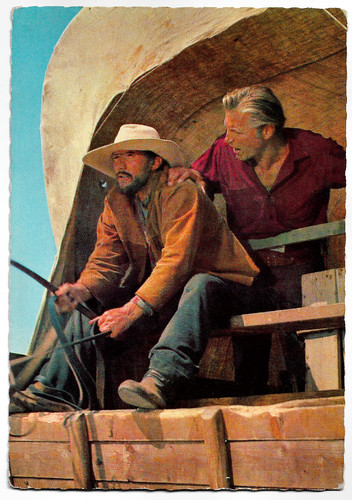
German postcard, no. E 7. Photo: Constantin. Lex Barker in Winnetou - 1. Teil/Apache Gold (1963). Caption: The Indians shoot fire arrows, the covered wagons burn.
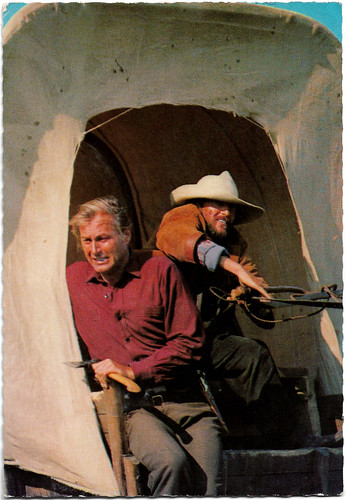
German postcard, no. E 8. Photo: Constantin. Lex Barker in Winnetou - 1. Teil/Apache Gold (1963). Caption: The Kiowa Indians are overwhelming, one has to get the best out of the situation. Old Shatterhand comes up with a trick.
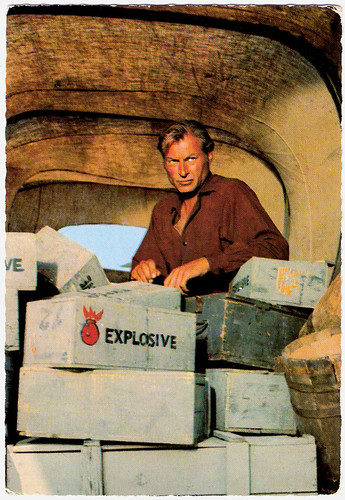
German postcard, no. E 9. Photo: Constantin. Lex Barker in Winnetou - 1. Teil/Apache Gold (1963). Caption: Old Shatterhand puts a rat in the ammunition and saves himself with a bold leap onto the horse. The remaining car, surrounded by Kiowas, explodes.

German postcard, no. E 10. Photo: Constantin. Scene from Winnetou - 1. Teil/Apache Gold (Harald Reinl, 1963). Caption: Santer's headquarters are in the Roswell saloon. Here he and his cronies cook up his wicked pranks against the Great Western Railroad and the Apaches.

German postcard, no. E 11. Photo: Constantin. Chris Howland as Lord Tuff-Tuff in Winnetou - 1. Teil/Apache Gold (1963). Caption: One looks scornfully at the incoming Cook agent, whose innocuous endeavor is to photograph Indians in full war coats.

German postcard, no. E 12. Photo: Constantin. Lex Barker in Winnetou - 1. Teil/Apache Gold (1963). Caption: Since the site manager Bancroft, against all agreements and under pressure from Santer, does not lead the railway line around but through the Apache area, Old Shatterhand rides to Rosweil.
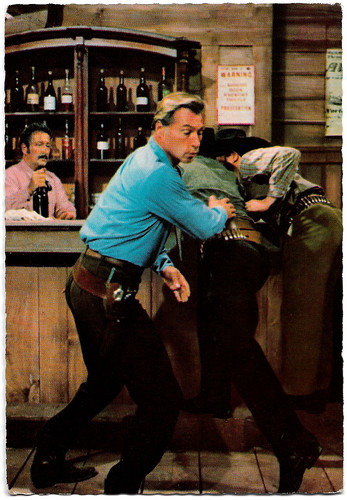
German postcard, no. E 13. Photo: Constantin. Lex Barker in Winnetou - 1. Teil/Apache Gold (1963). Caption: Even the steel hard fists of Old Shatterhands are inferior to the superiority of Santer's gang. He and his friends bring Bancroft back to the railroad warehouse.

German postcard, no. E 14. Photo: Constantin. Pierre Brice and Hrvoje Svob in Winnetou - I. Teil/Apache Gold (1963). Caption: Winnetou, outraged about all the atrocities of the invaders, rides with his white teacher Klekih-Petra to the final negotiations in the camp of the railway workers.
The storyline of every Karl May film is basically the same. The two friends Winnetou and Old Shatterhand try to solve the problems between red and white people and in the end they succeed, of course.
According to Karl May's story, first-person narrator Old Shatterhand encounters Winnetou and after initial dramatic events, a true friendship between Old Shatterhand and the Apache arises. On many occasions, they give proof of great fighting skills but also of compassion for other human beings.
The Karl May novels portray a belief in an innate ‘goodness’ of mankind. With about 200 million copies worldwide, Karl May was one of the best selling German writers of all time.
In the books, Winnetou became the chief of the tribe of the Mescalero Apaches (and of the Apaches in general, with the Navaho included) after his father Intschu-tschuna and his sister Nscho-tschi were slain by the white bandit Santer.
Winnetou rode a horse called Iltschi (Wind) and had a famous rifle called Silberbüchse (The Silver Gun), a double-barrel rifle of which the stock and butt were decorated with silver studs. Old Shatterhand became the blood brother of Winnetou and rode the brother of Iltschi, called Hatatitla (Lightning).
Karl May's Winnetou novels symbolise, to some extent, a romantic desire for a simpler life in close contact with nature. In fact, the popularity of the series is due in large part to the ability of the stories to tantalise fantasies many Europeans had and have for this more untamed environment.

German postcard, no. E 17. Photo: Constantin. Pierre Brice and Lex Barker in Winnetou - 1. Teil/Apache Gold (Harald Reinl, 1963). Caption: Old Shatterhand sneaks into the Kiowas' camp and frees the tied Winnetou undetected.

German postcard, no. E 18. Photo: Constantin. A scene from Winnetou - 1. Teil/Apache Gold (1963). Caption: A fight between Santers and Old Shatterhands begins in Roswell. At the same time, Winnetou is attacking the whites with his Apaches.

German postcard, no. E 19. Photo: Constantin. Lex Barker in Winnetou - 1. Teil/Apache Gold (1963). Caption: Old Shatterhand, who feels like a friend of the Apaches and especially Winnetou, has to fight against them. There are many deaths on both sides.

German postcard, no. E 20. Photo: Constantin. Scene from Winnetou - 1. Teil/Apache Gold (Harald Reinl, 1963). Caption: Only Santer and one of his cronies could save themselves in the mountains. Old Shatterhand and his followers are captured by the Apaches.
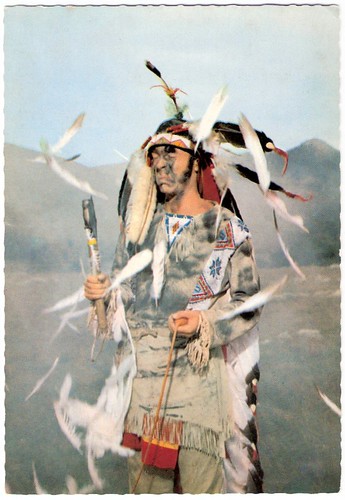
German postcard, no. E 21. Photo: Constantin. Chris Howland in Winnetou - 1. Teil/Apache Gold (1963). Caption: What do you do as a reporter, when you get no Indian in front of your camera? You put on some makeup and make a self-portrait, here, unfortunately, it failed.

German postcard, no. E 22. Photo: Constantin. Ralf Wolter as Sam Hawkens in Winnetou - 1. Teil/Apache Gold (1963). Caption: The conquering Apaches decide in the powwow to kill the white prisoners. The cranky Sam Hawkens just can't understand, why this is the way he has to go to the happy hunting ground.
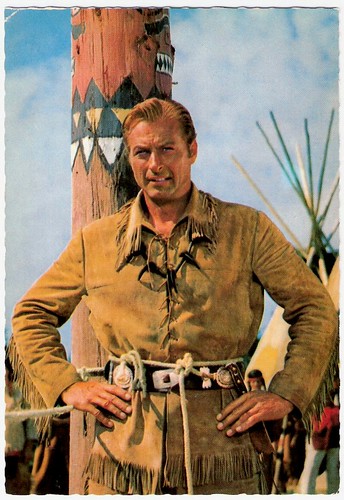
German postcard, no. E 23. Photo: Constantin. Lex Barker in Winnetou - 1. Teil/Apache Gold (1963). Caption: Old Shatterhand has also been sentenced to die at the stake. He regrets emphatically, that he rescued Winnetou from the Kiowas. An ordeal by battle will decide.

German postcard, no. E 24. Photo: Constantin. Lex Barker in Winnetou - 1. Teil/Apache Gold (1963). Caption: Haunted by the Apache boats Old Shatterhand must cross a raging river.
"A thief, an impostor, a sexual pervert, a grotesque prophet of a sham Messiah!"..."The Third Reich is Karl May's ultimate triumph!" wrote Klaus Mann, son of Thomas Mann in 1940.
To which Albert Einstein replied: "...even today he has been dear to me in many a desperate hour."
Herman Hesse called his books "indispensable and eternal" and the writer and director Carl Zuckmayer even christened his daughter 'Winnetou' in honour of May's great Apache chief.
Yet, the English-speaking world is almost totally ignorant of May and his heroes Winnetou, Old Shatterhand, or Kara Ben Nemsi and his Arab friend Hadji Halef Omar who shared many an adventure in what is now called Kurdistan just over a hundred years ago.
The reason is simple. Almost none of May's books have ever been translated into English.

German postcard, no. E 25. Photo: Constantin. Lex Barker and Mavid Popovic in Winnetou - I. Teil/Apache Gold (1963). Caption: In the water, there is a bitter fight between Old Shatterhand and Winnetou's father, the chief of the Apaches.

German postcard, E 26. Photo: Constantin. Lex Barker and Pierre Brice (right) in Winnetou -I. Teil/Apache Gold (1963). Caption: Old Shatterhand, superior in strength and cunning to the Apache chieftain, defeats him, but spares his life. The judgment of God has spoken. Old Shatterhand and his followers are free.

German postcard, no. E 28. Photo: Constantin. Lex Barker in Winnetou - 1. Teil/Apache Gold (1963). Caption: The blood brotherhood between Winnetou and Old Shatterhand is sealed with a solemn ceremony.

German postcard, no. E 29. Photo: Constantin. Pierre Brice and Lex Barker in Winnetou - 1. Teil/Apache Gold (1963). Caption: In front of the dead tree with the laid-out Klekih-Petra, the blood brothers Winnetou and Old Shatterhand swear to take revenge on the murderous Santer.
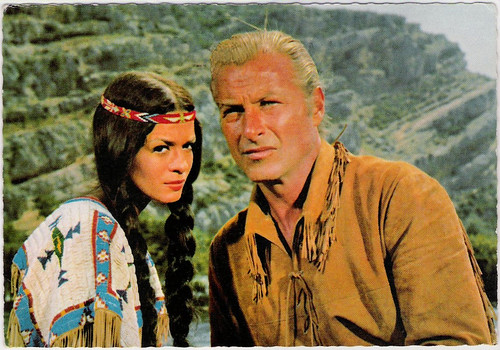
German postcard, no. E 30. Photo: Constantin. Marie Versini and Lex Barker in Winnetou - 1. Teil/Apache Gold (1963). Caption: Winnetou's sister Nscho-tschi also joins the bond of friendship.

German postcard, no. E 31. Photo: Constantin. Mario Adorf (left) as Santer in Winnetou - 1. Teil/Apache Gold (1963). Caption: Santer and his gang are still looking for the Apache gold. Unnoticed they follow the course of the Indians to the hiding place of the treasure.
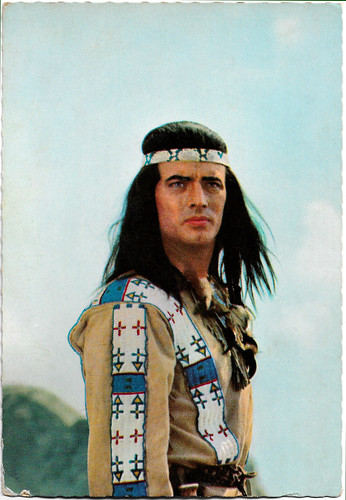
German postcard, no. E 32. Photo: Constantin. Pierre Brice in Winnetou - 1. Teil/Apache Gold (Harald Reinl, 1963). Caption: According to the old Apache custom, only the chief and his children are allowed to enter the treasury. Winnetou takes the rear guard with watchful eyes.

German postcard, no. E 33. Photo: Constantin. Marie Versini in Winnetou - 1. Teil/Apache Gold (Harald Reinl, 1963). Caption: A shot rang out from ambush. Horrified, Nscho-tschi sees her father collapse dead.

German postcard, no. E 34. Photo: Constantin. Marie Versini in Winnetou - 1. Teil/Apache Gold (Harald Reinl, 1963). Caption: Nscho-chi takes up her dead father's rifle to help her brother Winnetou in battle. She too is fatally shot.
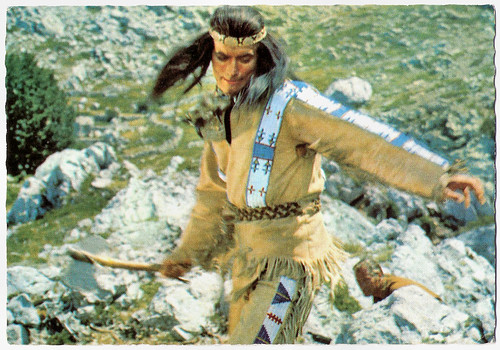
German postcard, no. E 35. Photo: Constantin. Pierre Brice and Lex Barker in Winnetou - I. Teil/Apache Gold (1963). Caption: The hurrying Old Shatterhand witnesses how Winnetou takes revenge on Santer. What remains are two friends who go against the odds together.

German postcard by ISV, no. E 27. Photo: Constantin. Pierre Brice in Winnetou - 1. Teil/Apache Gold (Harald Reinl, 1963).
Sources: Julian Crandall Hollick (Karl May's Imaginary America), Wikipedia, and IMDb.
This post was last updated on 14 September 2020.

German postcard, no. E 1. Photo: Constantin. Pierre Brice in Winnetou - 1. Teil/Apache Gold (Harald Reinl, 1963). Caption: This is Winnetou, the son of the chief of the Apaches.

German postcard, no E 2. Photo: Constantin. Pierre Brice as Winnetou in Winnetou - 1.Teil/Apache Gold (1963). Caption: A friend of the oppressed and enemy of the exploiters, Winnetou keeps a watchful eye over his country, which is rich in cattle and gold.

German postcard, no. E 3. Photo: Constantin. Dusko Dobudj as Black Eagle in Winnetou - 1. Teil/Apache Gold (Harald Reinl, 1963). Caption: Winnetou's most dangerous opponent is the greedy Santer. He kills Winnetou's messenger 'Black Eagle' and robs him of the gold.

German postcard, no. E 4. Photo: Constantin. Lex Barker as Old Shatterhand and Ralf Wolter (middle) as Sam Hawkens in Winnetou - 1. Teil/Apache Gold (1963). Caption: Old Shatterhand comes from the east as the companion of a trek and brings supplies of weapons and food to the Great Western Railroad.

German postcard, no. E 5. Photo: Constantin. Lex Barker as Old Shatterhand and Ralf Wolter as Sam Hawkens in Winnetou - 1. Teil (1963). Caption: Sam Hawkens joins him, an experienced westerner who helps the Greenhorn Old Shatterhand to the finish.

German postcard, no. E 6. Photo: Constantin. A scene from Winnetou - 1. Teil/Apache Gold (1963). Caption: Incited by Santer, the Kiowas attack the trek.
Forever Winnetou
The stars of Winnetou – 1. Teil were again Lex Barker as Old Shatterhand and Pierre Brice as Winnetou. They both came up with a fine performance.
Brice became so popular that he would stay Winnetou throughout his whole life. First, he played the native American chief in eleven films between 1962 and 1968. After the period of the Karl May films was over, Brice continued to perform the role on several stages in Germany and also in TV series.
The cast of Winnetou – 1. Teil also included French actress Marie Versini as Winnetou’s sister Nscho-tschi, Mario Adorf as Frederick Santer - the bad guy who shoots Ntscho-tschi, Chris Howland as the comic Lord Tuff-Tuff, Ralf Wolter as Sam Hawkens, Mavid Popovic as Intschu-tschuna - Winnetou's father, and Dunja Rajter as Belle.
Christian Wolff was the German voice of Winnetou. The principal shooting took place in national park Paklenica karst river canyon, in Yugoslavia, now Croatia.

German postcard, no. E 7. Photo: Constantin. Lex Barker in Winnetou - 1. Teil/Apache Gold (1963). Caption: The Indians shoot fire arrows, the covered wagons burn.

German postcard, no. E 8. Photo: Constantin. Lex Barker in Winnetou - 1. Teil/Apache Gold (1963). Caption: The Kiowa Indians are overwhelming, one has to get the best out of the situation. Old Shatterhand comes up with a trick.

German postcard, no. E 9. Photo: Constantin. Lex Barker in Winnetou - 1. Teil/Apache Gold (1963). Caption: Old Shatterhand puts a rat in the ammunition and saves himself with a bold leap onto the horse. The remaining car, surrounded by Kiowas, explodes.

German postcard, no. E 10. Photo: Constantin. Scene from Winnetou - 1. Teil/Apache Gold (Harald Reinl, 1963). Caption: Santer's headquarters are in the Roswell saloon. Here he and his cronies cook up his wicked pranks against the Great Western Railroad and the Apaches.

German postcard, no. E 11. Photo: Constantin. Chris Howland as Lord Tuff-Tuff in Winnetou - 1. Teil/Apache Gold (1963). Caption: One looks scornfully at the incoming Cook agent, whose innocuous endeavor is to photograph Indians in full war coats.

German postcard, no. E 12. Photo: Constantin. Lex Barker in Winnetou - 1. Teil/Apache Gold (1963). Caption: Since the site manager Bancroft, against all agreements and under pressure from Santer, does not lead the railway line around but through the Apache area, Old Shatterhand rides to Rosweil.

German postcard, no. E 13. Photo: Constantin. Lex Barker in Winnetou - 1. Teil/Apache Gold (1963). Caption: Even the steel hard fists of Old Shatterhands are inferior to the superiority of Santer's gang. He and his friends bring Bancroft back to the railroad warehouse.

German postcard, no. E 14. Photo: Constantin. Pierre Brice and Hrvoje Svob in Winnetou - I. Teil/Apache Gold (1963). Caption: Winnetou, outraged about all the atrocities of the invaders, rides with his white teacher Klekih-Petra to the final negotiations in the camp of the railway workers.
A famous rifle called Silberbüchse
The storyline of every Karl May film is basically the same. The two friends Winnetou and Old Shatterhand try to solve the problems between red and white people and in the end they succeed, of course.
According to Karl May's story, first-person narrator Old Shatterhand encounters Winnetou and after initial dramatic events, a true friendship between Old Shatterhand and the Apache arises. On many occasions, they give proof of great fighting skills but also of compassion for other human beings.
The Karl May novels portray a belief in an innate ‘goodness’ of mankind. With about 200 million copies worldwide, Karl May was one of the best selling German writers of all time.
In the books, Winnetou became the chief of the tribe of the Mescalero Apaches (and of the Apaches in general, with the Navaho included) after his father Intschu-tschuna and his sister Nscho-tschi were slain by the white bandit Santer.
Winnetou rode a horse called Iltschi (Wind) and had a famous rifle called Silberbüchse (The Silver Gun), a double-barrel rifle of which the stock and butt were decorated with silver studs. Old Shatterhand became the blood brother of Winnetou and rode the brother of Iltschi, called Hatatitla (Lightning).
Karl May's Winnetou novels symbolise, to some extent, a romantic desire for a simpler life in close contact with nature. In fact, the popularity of the series is due in large part to the ability of the stories to tantalise fantasies many Europeans had and have for this more untamed environment.

German postcard, no. E 17. Photo: Constantin. Pierre Brice and Lex Barker in Winnetou - 1. Teil/Apache Gold (Harald Reinl, 1963). Caption: Old Shatterhand sneaks into the Kiowas' camp and frees the tied Winnetou undetected.

German postcard, no. E 18. Photo: Constantin. A scene from Winnetou - 1. Teil/Apache Gold (1963). Caption: A fight between Santers and Old Shatterhands begins in Roswell. At the same time, Winnetou is attacking the whites with his Apaches.

German postcard, no. E 19. Photo: Constantin. Lex Barker in Winnetou - 1. Teil/Apache Gold (1963). Caption: Old Shatterhand, who feels like a friend of the Apaches and especially Winnetou, has to fight against them. There are many deaths on both sides.

German postcard, no. E 20. Photo: Constantin. Scene from Winnetou - 1. Teil/Apache Gold (Harald Reinl, 1963). Caption: Only Santer and one of his cronies could save themselves in the mountains. Old Shatterhand and his followers are captured by the Apaches.

German postcard, no. E 21. Photo: Constantin. Chris Howland in Winnetou - 1. Teil/Apache Gold (1963). Caption: What do you do as a reporter, when you get no Indian in front of your camera? You put on some makeup and make a self-portrait, here, unfortunately, it failed.

German postcard, no. E 22. Photo: Constantin. Ralf Wolter as Sam Hawkens in Winnetou - 1. Teil/Apache Gold (1963). Caption: The conquering Apaches decide in the powwow to kill the white prisoners. The cranky Sam Hawkens just can't understand, why this is the way he has to go to the happy hunting ground.

German postcard, no. E 23. Photo: Constantin. Lex Barker in Winnetou - 1. Teil/Apache Gold (1963). Caption: Old Shatterhand has also been sentenced to die at the stake. He regrets emphatically, that he rescued Winnetou from the Kiowas. An ordeal by battle will decide.

German postcard, no. E 24. Photo: Constantin. Lex Barker in Winnetou - 1. Teil/Apache Gold (1963). Caption: Haunted by the Apache boats Old Shatterhand must cross a raging river.
An impostor, a sexual pervert, a grotesque prophet of a sham Messiah!
"A thief, an impostor, a sexual pervert, a grotesque prophet of a sham Messiah!"..."The Third Reich is Karl May's ultimate triumph!" wrote Klaus Mann, son of Thomas Mann in 1940.
To which Albert Einstein replied: "...even today he has been dear to me in many a desperate hour."
Herman Hesse called his books "indispensable and eternal" and the writer and director Carl Zuckmayer even christened his daughter 'Winnetou' in honour of May's great Apache chief.
Yet, the English-speaking world is almost totally ignorant of May and his heroes Winnetou, Old Shatterhand, or Kara Ben Nemsi and his Arab friend Hadji Halef Omar who shared many an adventure in what is now called Kurdistan just over a hundred years ago.
The reason is simple. Almost none of May's books have ever been translated into English.

German postcard, no. E 25. Photo: Constantin. Lex Barker and Mavid Popovic in Winnetou - I. Teil/Apache Gold (1963). Caption: In the water, there is a bitter fight between Old Shatterhand and Winnetou's father, the chief of the Apaches.

German postcard, E 26. Photo: Constantin. Lex Barker and Pierre Brice (right) in Winnetou -I. Teil/Apache Gold (1963). Caption: Old Shatterhand, superior in strength and cunning to the Apache chieftain, defeats him, but spares his life. The judgment of God has spoken. Old Shatterhand and his followers are free.

German postcard, no. E 28. Photo: Constantin. Lex Barker in Winnetou - 1. Teil/Apache Gold (1963). Caption: The blood brotherhood between Winnetou and Old Shatterhand is sealed with a solemn ceremony.

German postcard, no. E 29. Photo: Constantin. Pierre Brice and Lex Barker in Winnetou - 1. Teil/Apache Gold (1963). Caption: In front of the dead tree with the laid-out Klekih-Petra, the blood brothers Winnetou and Old Shatterhand swear to take revenge on the murderous Santer.

German postcard, no. E 30. Photo: Constantin. Marie Versini and Lex Barker in Winnetou - 1. Teil/Apache Gold (1963). Caption: Winnetou's sister Nscho-tschi also joins the bond of friendship.

German postcard, no. E 31. Photo: Constantin. Mario Adorf (left) as Santer in Winnetou - 1. Teil/Apache Gold (1963). Caption: Santer and his gang are still looking for the Apache gold. Unnoticed they follow the course of the Indians to the hiding place of the treasure.

German postcard, no. E 32. Photo: Constantin. Pierre Brice in Winnetou - 1. Teil/Apache Gold (Harald Reinl, 1963). Caption: According to the old Apache custom, only the chief and his children are allowed to enter the treasury. Winnetou takes the rear guard with watchful eyes.

German postcard, no. E 33. Photo: Constantin. Marie Versini in Winnetou - 1. Teil/Apache Gold (Harald Reinl, 1963). Caption: A shot rang out from ambush. Horrified, Nscho-tschi sees her father collapse dead.

German postcard, no. E 34. Photo: Constantin. Marie Versini in Winnetou - 1. Teil/Apache Gold (Harald Reinl, 1963). Caption: Nscho-chi takes up her dead father's rifle to help her brother Winnetou in battle. She too is fatally shot.

German postcard, no. E 35. Photo: Constantin. Pierre Brice and Lex Barker in Winnetou - I. Teil/Apache Gold (1963). Caption: The hurrying Old Shatterhand witnesses how Winnetou takes revenge on Santer. What remains are two friends who go against the odds together.

German postcard by ISV, no. E 27. Photo: Constantin. Pierre Brice in Winnetou - 1. Teil/Apache Gold (Harald Reinl, 1963).
Sources: Julian Crandall Hollick (Karl May's Imaginary America), Wikipedia, and IMDb.
This post was last updated on 14 September 2020.
No comments:
Post a Comment